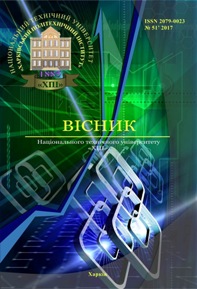Adaptive training system for IT-companies personnel: design principals, architectural models and implementation technology
DOI:
https://doi.org/10.20998/2079-0023.2017.51.06Keywords:
Adaptation, adaptive system, corporate training, IТ-company, e-CF, SFIAAbstract
Investigated problems and not resolved issues related to corporate training for IT-companies personnel, explored the actuality and goal of creating adaptive training and learning systems r to improve the quality and speed of competence growth of IT-companies’ personnel. Reviewed learning and training systems structures and main differences. Reviewed existing top learning and training systems and selected two of them – Explore Gate and Forma LMS – to be basically tested to explore the common requirements, functionality and not resolved issues. Investigated frameworks for IT competences and skills, exactly e-CF (European e-Competence Framework) and SFIA (Skills Framework for the Information Age). These frameworks are proposed to be used in training system for IT companies’ personnel. Reviewed architectures and models that can be used for adaptive learning and training systems. Proposed ontology of adaptive training system for IT-companies personnel and algorithm to create the training track for employee according to the selected competence, current level of knowledge and skills, aim level of competence and preferences.
References
Pupkov K. A., Egupov N.D. Metody klassicheskoy i sovremennoy teorii avtomaticheskogo upravleniya [Methods of classical and modern theory of automatic control].Moscow, MGTU im. N.E. Baumana, 2004. 784 p.
Rastrigin L. A. Adaptatsiya slozhnykh sistem [Adaptation of complex systems]. Riga, Zinatne, 1981. 375 p.
Rybina G. V. Obuchayushchie integrirovannye ekspertnye sistemy: nekotorye itogi i perspektivy [Educational Integrated Expert Systems: Some Results and Prospects]. Iskusstvennyy intellekt i prinyatie resheniy. 2008, no. 1, pp. 22–46.
Rastrigin L. A. Adaptivnoe obuchenie s model'yu obuchaemogo [Adaptive training with the model of the trainee]. Riga, Zinatne, 1988. 160 p.
Zvi Dror, Dr. Josef Ben-Ezra, Yehuda Holtzman, Luca Bercovici, Misty Remington, Sandy Erez, Sagi Dror, Tal Cohen. Explore Gate [Explore Gate]. Available at: https://www.exploregate.com. (accessed 10.10.2017)
Elearnit, Joint Technologies, Purple Network, Grifo Multimedia. Formа LMS [Forma LMS]. Available at : https://www.exploregate.com. (accessed 15.10.2017)
CEN European e-Competence Framework [European e-Competence Framework]. Available at : http://www.ecompetences.eu/methodology (accessed 03.11.2017)
CEN European e-Competence Framework 3.0. A Common European Framework for ICT Professionals in all industry sectors [European e-Competence Framework 3.0. A Common European Framework for ICT Professionals in all industry sectors.]. CWA 16234, 2014. Part 1.
CEN European e-Competence Framework 3.0. A Common European Framework for ICT Professionals in all industry sectors [European e-Competence Framework 3.0. A Common European Framework for ICT Professionals in all industry sectors.]. CWA 16234, 2014. Part 2.
Adam Thilthorpe, Michelle Richmond, Mark Lillycrop, Dean Cascar, Robert Deri, Ian Seward, Lucy Ryan SFIA Foundation [SFIA Foundation]. Available at : https://www.sfia-online.org. (accessed 11.10.2017)
Alexandra C., Paul De Bra, Daniel B., Stefano C., Hugh Charles D. Interfacing adaptive solutions with corporate training systems [Interfacing adaptive solutions with corporate training systems]. ProLearn Network of Excellence (IST 507310) [ProLearn Network of Excellence (IST 507310)]. Welfengarten, 2006, Deliverable 1.9.
Ellis P. F., Mackie B., Kuznia K. D. Corporate e-Learning impact on employees [Corporate e-Learning impact on employees]. Global journal of business research [Global journal of business research]. Ashford, 2014, vol. 8, no. 4.
Downloads
Published
How to Cite
Issue
Section
License
Copyright (c) 2018 Bulletin of NTU “Kharkiv Polytechnic Institute”. Series: System Analysis, Control and Information TechnologiesAuthors who publish with this journal agree to the following terms:
- Authors retain copyright and grant the journal right of first publication with the work simultaneously licensed under a Creative Commons Attribution License that allows others to share the work with an acknowledgement of the work's authorship and initial publication in this journal.
- Authors are able to enter into separate, additional contractual arrangements for the non-exclusive distribution of the journal's published version of the work (e.g., post it to an institutional repository or publish it in a book), with an acknowledgement of its initial publication in this journal.
- Authors are permitted and encouraged to post their work online (e.g., in institutional repositories or on their website) prior to and during the submission process, as it can lead to productive exchanges, as well as earlier and greater citation of published work (See The Effect of Open Access).


